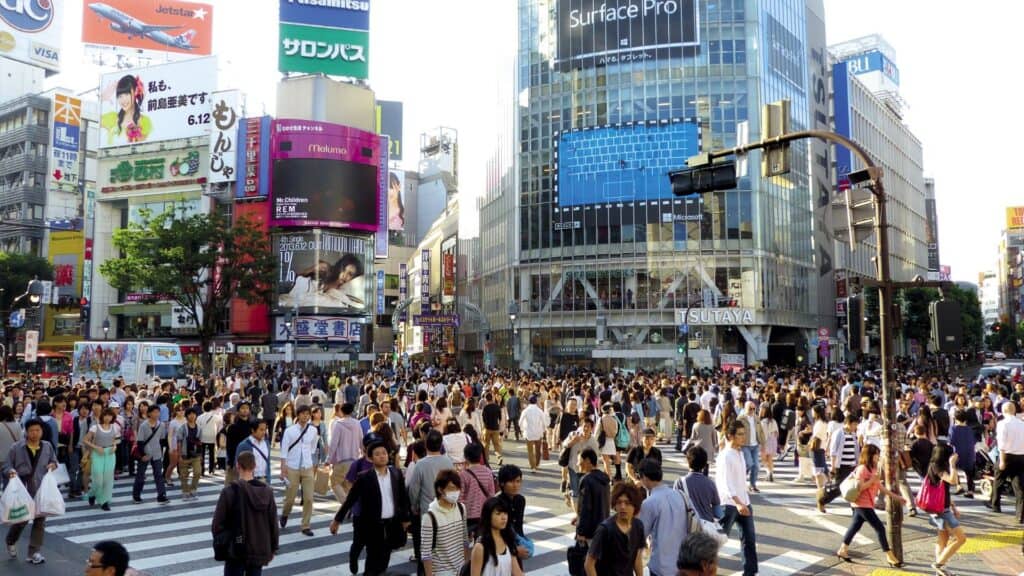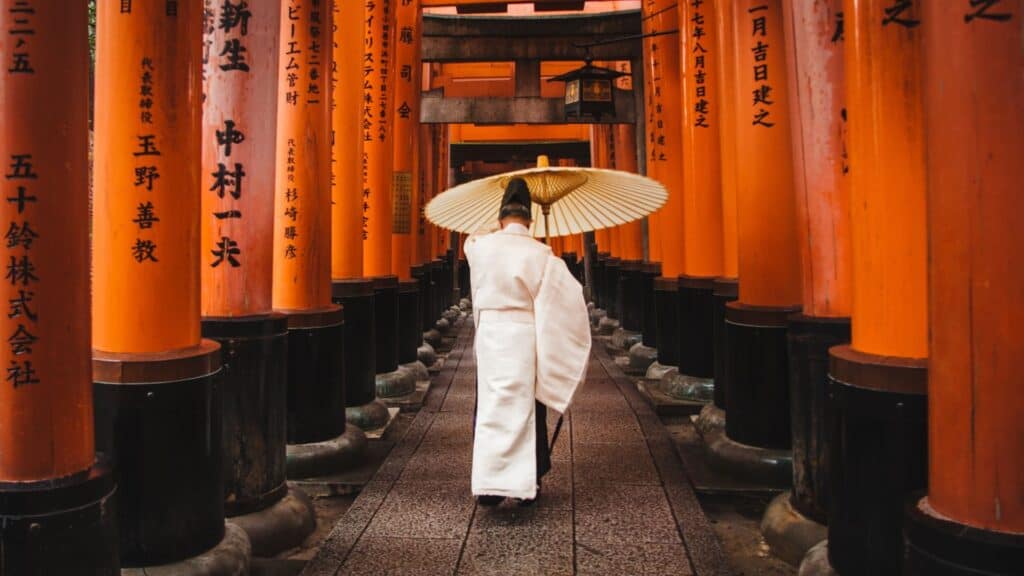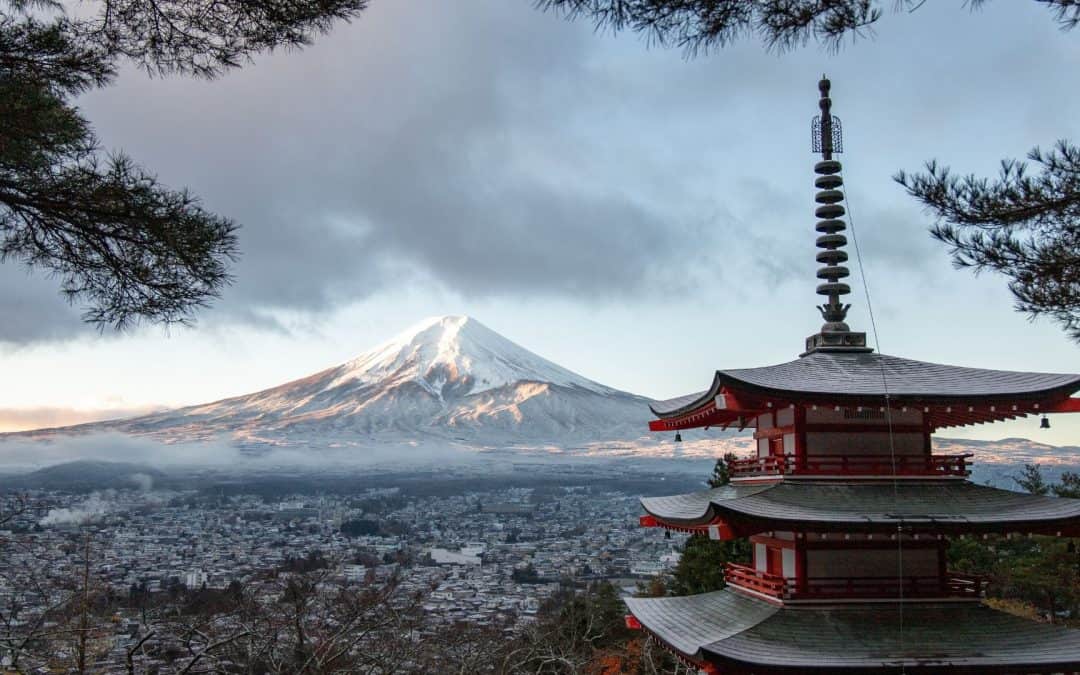If you are planning to travel or move to Japan and don’t speak any Japanese, here are some common daily Japanese phrases you can memorise easily and quickly to get by every day!
Whether you’re navigating the bustling streets of Tokyo, ordering food at a local restaurant, or simply greeting new friends, these essential phrases will help you communicate more effectively and confidently. With a bit of practice, you’ll find yourself blending in with the locals and making the most of your Japanese experience.
Essential Japanese Travel Phrases Every Tourist Must Know
Basic Greetings and Phrases

Here are some essential Japanese travel phrases you will need when travelling in Japan:
- “Ohayou gozaimasu (おはようございます)” means “good morning.” You can shorten it to just “ohayou” if you’re speaking to a friend or someone you know well.
- “Konnichiwa (こんにちは)” is usually translated as “good afternoon,” but it’s also understood as “hello” and you’ll hear it throughout the day.
- “Konbanwa (こんばんは)” means “good evening” and is used throughout the evening and night.
- “Arigatou gozaimasu (ありがとうございます)” means “thank you.” Similar to “ohayou gozaimasu,” you can omit “gozaimasu” if you’re speaking to a friend or someone you know well.
- “Douzo (どうぞ)” means “please go ahead.” You can use this when opening the door for someone, offering a seat to someone, or asking someone to eat.
- “Sumimasen (すみません)” has been said to be one of the most difficult Japanese words to translate as it can mean several things. It can mean “I’m sorry” or “thank you,” but it’s most commonly translated as “excuse me.” For example, when a waiter refills your glass, you’ll use “sumimasen” to say “thank you” (instead of “arigatou gozaimasu”) in a roundabout way: “excuse me for making you fill my glass.” Or, if you accidentally bump into someone, you use “sumimasen” to say “I’m sorry”: “excuse me for bumping into you.” You’ll probably use it more commonly to get someone’s attention or to get past someone.
- “Gomennasai (ごめんなさい)” means “I’m sorry.” We’ve just discussed that “sumimasen” can also mean “I’m sorry,” but unlike “sumimasen” which has more humble connotations, “gomennasai” has more sorrowful, guilty connotations. If you were to cause a person great distress, for example, if you spilled a drink on their shirt or if you lost something of theirs, you would use “gomennasai” instead of “sumimasen.”
Commonly Heard Phrases

When you are travelling in Japan, these Japanese common daily phrases are very important for you. Check these Japanese travel phrases to make your travel in Japan more convenient:
- Both “onegaishimasu (お願いします)” and “kudasai (ください)” mean “please,” but “onegaishimasu” is tied more to actions, while “kudasai” is tied more to things. For example, if a cashier in a convenience store asks if you’d like them to microwave your meal (an action), you would use “onegaishimasu” to say “yes, please do this.” In a restaurant, if you’d like a glass of water (a thing), you would say “mizu (水) kudasai” to say, “water, please.”
They’re used interchangeably in some situations so don’t worry too much about using the “correct” one; you’ll be understood just fine either way.
- “Daijoubu (大丈夫)” means “okay” or “fine.” For example, if a cashier asks if you’d like a plastic bag, you can say “daijoubu desu” to say “I’m fine, thanks.” Or you may ask a cashier, “kurejitto kaado (クレジットカード) wa daijoubu desu ka” to ask, “Is [paying with] a credit card okay?”
For the following few phrases, remember these basics:
- ~masu is positive.
- ~masen is negative.
- ~ka is a question mark.
For example:
- “Arimasu (あります)” means “I have” or “there is.”
- “Arimasen (ありません)” means “I do not have” or “there isn’t.”
- “Arimasu ka (ありますか)” asks “do you have” or “is there.”
For example, you may ask a bar owner, “toire (トイレ) wa arimasu ka” to ask, “is there a toilet?” He/she may reply, “toire wa arimasu/arimasen” to answer “there is/isn’t a toilet.” This will be particularly handy in shops and restaurants when you’re looking for a particular product or food item.
- “Dekimasu (できます)” means “I can.”
- “Dekimasen (できません)” means “I cannot.”
- “Dekimasu ka (できますか)” asks “can you.”
For example, someone may ask you “tenisu (テニス) dekimasu ka (can you play tennis)”, and you can reply with “tenisu dekimasu/dekimasen” to answer “I can/cannot play tennis.”
- “Wakarimasu (わかります)” means “I understand.”
- “Wakarimasen (わかりません)” means “I do not understand.”
- “Wakarimasu ka (わかりますか)” asks “do you understand.”
For example, you may ask someone, “eigo (英語) ga wakarimasu ka (do you understand English?)”, and they will reply “eigo ga wakarimasu/wakarimasen” to answer “I do/do not understand English.”
Phrases Used in Restaurants

Here are some amazing Japanese travel phrases you would need in a restaurant to easily communicate with the waiters and restaurant staff. You can use these Japanese common daily phrases every day in Japan:
- “Yoyaku (予約)” means “reservation.” To tell someone you have a reservation, you say, “yoyaku ga arimasu.”
- “Otooshi (お通し)” refers to an appetiser that you receive in exchange for paying a mandatory entry/table fee that some restaurants will charge. These entry/table fees range anywhere between 300 and 1000 yen (USD$2.8 to $9.35).
- “Omakase (お任せ)” is derived from the verb “omakase masu” which means to “leave it up to” someone. When asking for “omakase” in a restaurant, you are “leaving it up to” the chef to decide what to serve you. This is usually available only in high-end restaurants, especially sushi restaurants.
- “Osusume (おすすめ)” means “recommendation.” This is really useful if you visit restaurants that don’t have English menus; you can simply ask the waiter/waitress for a recommendation, which is usually the restaurant’s signature dish.
Phrases for Asking Questions

ere are some essential Japanese travel phrases for asking questions:
- “___ wa nan desu ka (___はなんですか)” asks “what is.” For example, “kore (これ) wa nan desu ka” means “what is this?”
- “___ wa doko desu ka (___はどこですか)” asks “where is.” For example, “eki (駅) wa doko desu ka” means “where is the station?”
- “___ wa ikura desu ka (___はいくらですか)” asks “how much is.” For example, “biiru (ビール) wa ikura desu ka” means “how much is a beer?”
Enhance Your Japanese Travel Experience
Learning a new language can be challenging, but with the right tools, it can be an enjoyable and exciting journey. By incorporating these Japanese travel phrases into your daily vocabulary, you’ll find your experience in Japan more enriching and enjoyable. These phrases will help you navigate various situations, from simple greetings to more complex interactions in restaurants and shops.
For more resources, check out our blog posts on:
- Top 30 Japanese slangs to help you sound like a pro
- Common mistakes people make when learning Japanese
- Best way and tips to learn the Japanese language quickly and easily
- Japanese Phrases For Your Night Out in Tokyo
- Useful Japanese slangs
- Japanese onomatopoeia
Embrace the journey of learning Japanese and immerse yourself in the culture. Happy travels!


Recent Comments